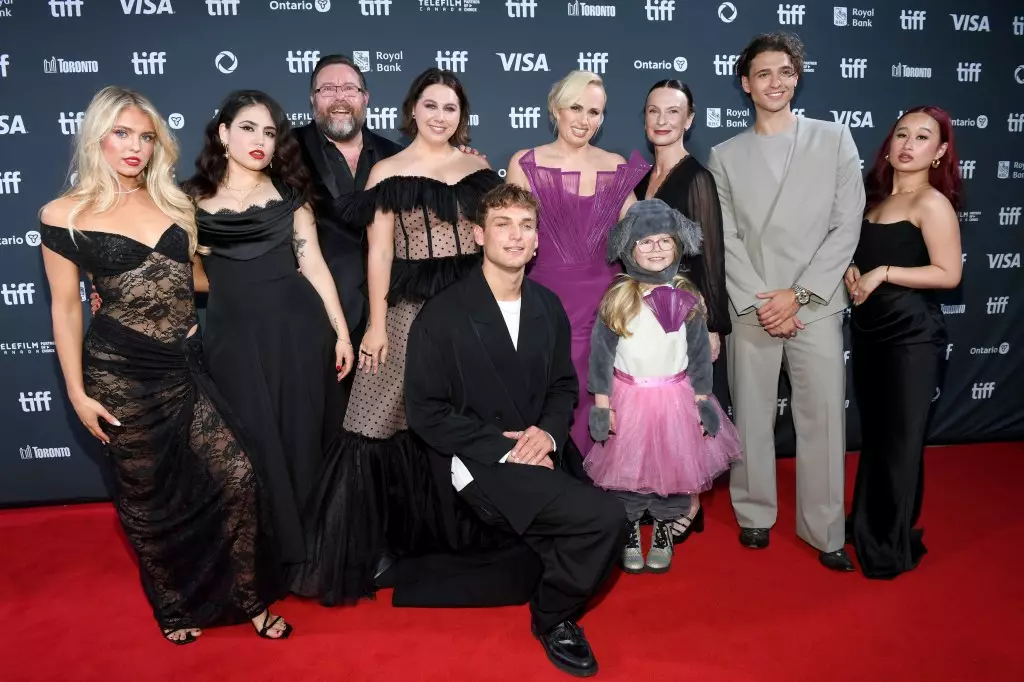The entertainment industry is no stranger to conflict, especially when it stems from the complex web of contract negotiations and personal grievances among stakeholders. The recent legal battle involving actress Rebel Wilson and the producers of her film *The Deb* encapsulates this drama, raising fundamental questions about accountability, ethical practices, and the power dynamics at play within Hollywood. In a rapidly developing situation, Wilson has formally announced her counter-complaint against the producers, making clear her determination not just to protect her interests, but to stand up for others who may have suffered in silence.
The turmoil began brewing this summer when Wilson publicly criticized the producers for their management of the *The Deb* project. The film’s world premiere was at stake, allegedly jeopardized by the trio of producers: Amanda Ghost, Gregor Cameron, and Vince Holden. Wilson’s social media posts, which addressed issues such as a perceived mishandling of funds and “inappropriate behavior” directed towards her co-star, Charlotte MacInnes, caught the industry’s attention. This opened the floodgates for accusations, laying bare a culture where bullying and misconduct can persist unchecked, particularly against women in positions of power.
The initial response from the producers was swift and forceful. Referring to Wilson’s claims as “false” and “defamatory,” they escalated the situation by filing a defamation lawsuit against her. This tactical move might suggest an attempt to quash dissent and control the narrative, but it only fueled Wilson’s resolve to fight back, which culminated in her formal counter-complaint filed in September.
Wilson’s counter-complaint is a deeply scathing critique of her former colleagues’ alleged misconduct. The 35-page filing presents nine claims against the producers, portraying them as a “troubling triad” engaged in not only ethical violations but also illicit behaviors that range from theft to sexual misconduct. The stark language used—calling the producers “absolute f*ckwits”—is reflective of Wilson’s frustration and determination to expose what she describes as a toxic atmosphere. Statements made by her lawyer, Bryan Freedman, further amplify her stance, suggesting that the defendant producers have employed intimidation tactics to silence not just Wilson but perhaps others who have faced similar treatment.
This part of the legal debacle isn’t merely about Wilson against Ghost, Cameron, and Holden; it’s emblematic of a broader narrative around workplace culture in Hollywood, particularly how it pertains to women. Social media platforms have provided a stage for such voices to rise, allowing incidents of misconduct to come to light that were once relegated to whispers behind closed doors.
As the legal fireworks continue, the implications stretch far beyond Wilson’s individual case. When Freedman states that “only a fraction” of the producers’ alleged misconduct has been revealed, he hints at a possible reckoning for Hollywood—a place notorious for nurturing toxic environments. The call for accountability from figures like Wilson may inspire others who have been wronged to step up and speak out, promoting a culture of transparency and courage.
Moreover, Wilson’s stance serves as a catalyst for discussions regarding not only the ethical obligations producers have towards their cast and crew but also the systemic issues that allow such behavior to persist. Such conversations are paramount as many continue to advocate for a significant shift in how Hollywood operates, emphasizing safety and respect alongside artistic ambition.
While the courtroom battles will inevitably take time to resolve, the cultural shift prompted by cases like Wilson’s is already in full swing. Her boldness in confronting alleged wrongdoing sets a precedent and encourages collective action toward accountability and justice in the entertainment sector. Whether the producers will face severe repercussions or if this will turn into a lengthy legal war remains to be seen. However, one thing is clear: Rebel Wilson’s fight is emblematic of a broader movement towards creating a safer, more equitable industry for future generations. The ongoing saga promises more revelations, and as Wilson has suggested, we may only be seeing the tip of the iceberg.



Leave a Reply